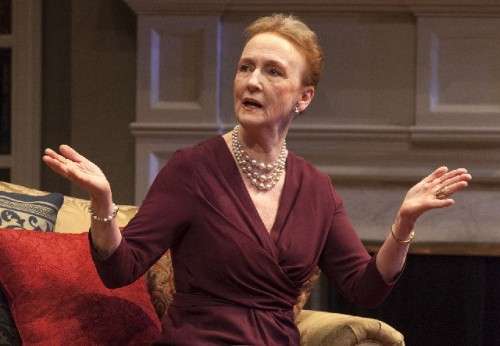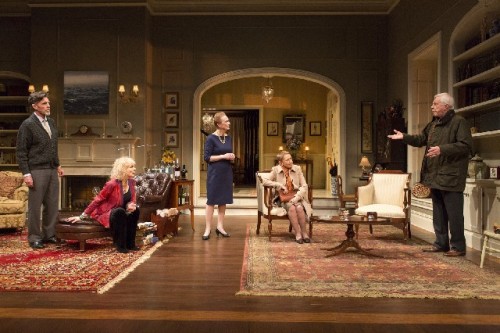A Delicate Balance by Edward Albee
McCarter Theatre Mounts a Fresh Take
By: Susan Hall - Feb 10, 2013
A Delicate Balance
By Edward Albee
Directed by Emily Mann
Kathleen Chalfont (Agnes), John Glover (Tobias), Penny Fuller (Claire), Roberta Maxwell (Edna), James A. Stephens (Harry), Francesca Faridany (Julia).
Daniel Ostling (Sets), Jennifer von Mayrhauser (Costumes), Lap Chi Cho (Lighting).
McCarter Theatre Center
Princeton, New Jersey
Through February 19, 2013.
A Delicate Balance, directed by Emily Mann at the McCarter Theater, etches the cost of buried feelings. Albee, who attended rehearsals in Princeton and delivers the opening announcement on the intercom, wrote that the play is about “the rigidity and ultimate paralysis which afflicts those who settle in too easily, waking up one day to discover that all the choices they have avoided no longer give them freedom of choice and what choices they have left are beside the point.”
Decorum and propriety may be the rules of the game, but the delicate balance between Agnes and Tobias, husband and wife, and their housemate, Agnes’ alcoholic sister Claire, is disrupted when Julia, their daughter and niece boomerangs home from her collapsing fourth marriage. Arriving also are best friends Edna and Harry, fleeing an unnamed terror. They retreat to Julia’s room which forces musical beds in the evening ahead. After thirty years of occupying not only separate beds but separate rooms, Agnes and Tobias find each other together.
Claire is an aching reminder of the doubts and fears that accompany every day life. “She is the strongest of us all,” says Agnes. “The walking wounded are the least susceptible.” Alcoholism was discovered by Wasps as one of the few available ways to escape the “cruel kindness” of what Agnes identifies in herself “the points of manners, timing tact,” as she devotes all her vital energy to externals, to form. She keeps to surfaces for Tobias. It is what her husband wants, we discover why in the third Act.
The great actors Kathleen Chalfont and John Glover make a fascinating Agnes and Tobias. While Chalfont keeps a stiff upper lip through the descent of her sister, the return of her daughter and the mysterious arrival of their best friends fleeing a new, unnamed existential terror to moving in uninvited, expose her pain.
Glover’s choice to watch the proceedings when he is not an active participant conveys the sense that he is trying to figure out what is going on before him. At first physically contained, whipped perhaps by the stiffness of his wife, he is occasionally witty but never direct. He wakes up to his sister-in-law because her booze-infested bon mots are true and often funny. She observes from the 50-yard line. As Tobias awakens, Glover becomes a physical man, lifting his legs like a trotter and flapping his arms.
While Penny Fuller did not take up the challenge of quick reversal mid sentence of Albee’s lines, her blowsy presence is both a relief and also an augur of the big emotional insights to come. She can face them, “the strongest of us all.” An odd truth about alcoholics who just can’t contain their feelings, even when they try to tamp them down with martinis.
The difficult and painful confrontation Agnes forces on Tobias at the beginning of Act Three breaks the stalemate where love by rejection and default has frozen into a mutual acceptance. The death of their second child, Teddy, who is barely an outline from his first mention to his demon faced, is what Martha, in Who’s Afraid of Virginia Wolff, calls a moment that “...has colored our whole life.” The death has complicated and comprised all these relationships and affected their subsequent lives right up to the first evening of the play’s action.
The emotional pain of Teddy’s death was so intolerable that Tobias could not risk another child. Agnes’ pain started when Tobias spilled himself on her belly for a year and then began sleeping in another room. But a delicate balance was preserved. Chalfont’s emotional blossoming and Tobias’ confession are incredibly moving, emotions that have been lost in all these years of burying the needs of those closest to us, as we retreat into personal sorrow and self-absorption.
Driving toward an unexpectedly hopeful ending, Tobias is liberated by his daughter, who asks for him, not her mother. Amidst some loud cries and accusations, he comes to call her a warm Julie, and she calls him “Pop,” a wonderfully un-Waspy and highly emotional version of Daddy. Francesca Faridany’s anger, and her bond with her emotionally loose aunt, are well done in Julia-becoming-Julie.
Roberta Maxwell and James A. Stephens retain the mystery of Harry and Edna’s arrival and departure.
Chalfont muses warmly: Perdu means lost, not merely the past. “It was nice to have you there, though I remember when it was a constancy, how easily I would fall asleep, pace my breathing to your breathing, and if we were touching! Ah, what a splendid cocoon that was.”
Much of the language is wonderful and Chalfont and Glover make the very most of it.
Chalfont continues: “You have hope, only, of growing old in the company of your steady wife, your alcoholic sister in law with occasional visits from our melancholy Julia. That is what you have, my dear Tobias, will it do?
Tobias reaches across for his wife’s hand in the dark sadness. A delicate balance between the cruel kindness on the surface and the dark depth below rises with the sun of a new morning.




